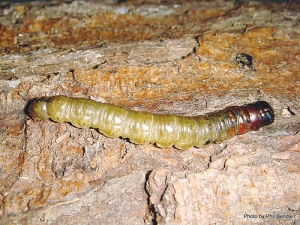Fresh research by AgResearch scientists will help unlock mysteries about a serious West Coast agricultural pest and allow farmers to make better management decisions and potentially save money.
Porina caterpillars are grazers that can reduce the long term quality and production of pasture, but AgResearch senior scientist Sarah Mansfield says little is known about the pest’s specific impact on the West Coast.
Now, research during a three year $300,000Sustainable Farming Fund project will allow farmers to better understand how to monitor for the pest and then kill them more efficiently and cost effectively.
“One of the big problems is that farmers often use control methods too late and after the damage is already done,” Mansfield says.
“Clearly this costs a great deal of time and money for very little return so we hope to be able to provide them with more effective tools to alleviate this.”
At low densities, porina are direct competitors with stock for foliage and at higher densities plants are destroyed allowing inferior plant – or weed – species to establish.
Young porina caterpillars construct silk-lined casings on the soil surface, and as they grow they construct permanent burrows in the soil. They emerge from their burrows at night to feed, severing grass and clover leaves at the base of plants and dragging them back to their burrows to eat them.
Moths fly in large numbers during spring and early summer. They do not feed, but each moth can lay up to 3000 eggs on the pasture surface. Caterpillars and the damage they cause are mostly noticeable from April to September.
Mansfield is analysing moth numbers from light trap collections on eight farms in the region over the summer.
“Our initial review of the traps is to identify adults to see if there is more than one species of porina. We suspect there is and that they fly at different times of the summer so in effect this means the porina problem gets ‘stretched’ over the summer making it even harder to control.”
Mansfield plans to run farm field days in early winter on the West Coast allowing farmers to observe first-hand the work scientists are doing.
In addition to SFF funding, the work is supported by DairyNZ, the Ministry for Business, Innovation and Employment, Ecosystems Bioprotection programme, Westland Milk Products, Landcorp and the West Coast Pest Management Group.


















